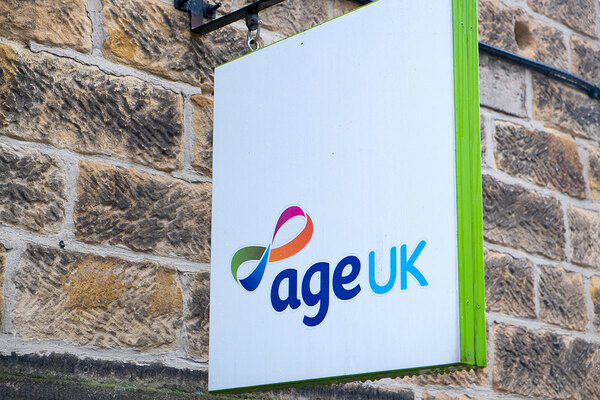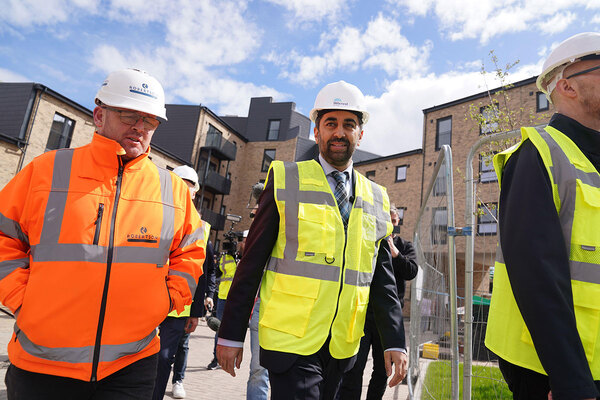Breaking point
As the axe falls on legal aid and local authority budgets, the lifeline offered by Citizens Advice Bureaux to people in need of help is hanging by a thread. Lydia Stockdale kicks off our midlands special by visiting the Birmingham branch
It is standing room only at the Birmingham Citizens Advice Bureau’s city centre office. Those who haven’t managed to get a seat gather resignedly around the doorway.
Even though no one will be seen by an advisor until 9.30am, many arrived early. Jean Bushell, a volunteer who works on the reception desk, says there were already several people waiting when she arrived at 7.30am.
A rough headcount reveals that this initially small group has now grown to about 40 individuals, and yet more will inevitably arrive. On an average day, the charity sees between 60 and 90 people who often have only one thing in common: they need help.
This used to be one of five Birmingham CAB centres located across the city operating an open-door policy so no appointment is necessary. Now it’s one of four, and the future is ‘very much uncertain’, explains acting chief executive Emma Cook.
In 2011, Birmingham Council slashed its funding for the Birmingham CAB by more than half, from £600,000 to £285,000 a year.

Negar waits to see an advisor
This initially led to the closure of the charity’s Handsworth office in October 2011, and a dramatic reduction in the opening hours of the remaining offices - instead of operating five days a week, the city centre office now opens on just three days, and the Northfield, Tyseley and Kingstanding offices open on two.
The charity has always relied heavily on volunteers like Ms Bushell, but the ratio of volunteers to paid staff is increasing. There are always around 200 people who volunteer at Birmingham CAB, but the number of paid staff has fallen from 85 to about 60.
In April this year, national cuts to civil legal aid meant that Birmingham CAB stopped receiving the £750,000 in legal services commission funding from the government it previously used to provide specialist debt and welfare benefits advice to more than 4,000 clients a year - this has led to the loss of 13 specialist advisor posts (see box: Bye, bye legal aid). So what has been the fallout from this?
‘Well, you can see the queue,’ answers Ms Cook. ‘We don’t have the resources, the staff, [or] the volunteers to see the level of clients that Birmingham needs us to see.’
Across the UK, Citizens Advice Bureaux are run by 382 individual charities. Birmingham CAB is just one of these, and it has calculated that in order to maintain the level of service it currently provides, it must raise £90,000 per year on top of the £285,000 it receives from its cash-strapped local authority.
Alternative funding
Over the past 12 months it has managed to raise £30,000 from various sources, including Sanctuary Housing’s Grand Ideas Fund and public donations, and has managed to continue helping everyone who comes to it asking for advice. But if the charity doesn’t get the necessary money together ‘we’ll just end up closing our doors [once we’ve reached capacity]’, Ms Cook says. ‘We will have to turn around and say “we can’t help you, we’ve got too many people to see today”, and you’re not a CAB service if you do that,’ she adds. The charity’s ethos is built around helping everyone who needs it, ensuring that individuals do not suffer through lack of knowledge of their rights and the responsibility of the services available to them, Ms Cook explains.
Going into this financial year, the Birmingham CAB is forced to reduce its service in line with the funding it receives. This means fewer appointments, fewer outreach hours, and fewer staff members and volunteers at a time when people need them the most. ‘With all of the changes with welfare reform, bedroom tax, the benefit cap, council tax support… we’re struggling,’ Ms Cook states.
Pre-empting change
In March, the charity began asking everybody who turned up at its centres to fill out a form detailing the benefits they receive. These details are then logged into the charity’s computer system and used by advisors when preparing individuals for the introduction of universal credit in October.
Birmingham CAB is already extremely concerned about how it will help everyone affected by welfare reform over the course of this year. Staff and volunteers are trying to give people advice early, so they are ready for when their benefits are paid to them directly in one go.
‘Some people don’t realise they’re going to be affected,’ says Ms Cook. ‘People see benefit claimants as people on jobseeker’s allowance or employment support allowance, but anybody receiving working tax credit or child tax credit is going to be brought into this new system, and there are will be glitches in that system.’
No matter how early the charity manages to get people ready, however, Ms Cook is concerned CAB is fighting a losing battle. ‘The fallout is going to be huge,’ she says.
Ms Cook believes it is the ‘layering’ of changes that will lead to problems. The introduction of the under-occupation penalty, the changes to council tax support, the replacing of employment support allowance with personal independence payments, and the start of universal credit, all happening one after another is ‘too much of a burden for any one individual, let alone an individual who is struggling from the start’, she explains.
Crisis point
‘We’re going to see people who are reaching crisis a hell of a lot sooner than they would normally. Crime will increase, the number of foodbanks will double - it’s going to be bedlam,’ she says.
Birmingham Council itself is facing significant financial pressures as a result of national budget restrictions. ‘In 2013/14 alone, it needs to find more than £110 million in cuts,’ says a spokesperson for the local authority. ‘By 2016/17 this figure will total more than £625 million.’

Shelley Blair awaits advice about her jobseeker’s allowance
‘Despite the severity of the challenge facing the council, we are committed to working with the third sector and acknowledge the important role it plays in the city, and we continue to work with the CAB in delivery of advice services in Birmingham,’ the spokesperson adds.
But the funding available for local advice and support agencies has dwindled, and there are no longer as many organisations for Birmingham CAB to refer people to. There are ‘fewer sources of low-level advice’, sums up benefits case worker Becky Johnson.
The funding granted to Birmingham CAB by the local authority is intended for case work relating to welfare benefits and debt advice - the charity does not receive any money for offering a gateway service or offering general advice.
‘All of the generalist advice areas, consumer, housing, employment, tax and immigration, there’s just no funding for that,’ says Ms Cook. Yet as smaller organisations close, the charity is becoming the first port of call for those needing help with relatively simple things, such as filling in official forms or telephoning local and national government departments.
When Inside Housing speaks to the people waiting in the charity’s city centre waiting room, it is clear they don’t know where else to turn. Shelley Blair, 33, is here for help with her jobseeker’s allowance, which has suddenly been stopped. She says she has been advised to come to the CAB by Jobcentre Plus. ‘If they weren’t here, I wouldn’t be getting sorted,’ Ms Blair states.
A woman called Negar, who does not want to give her full name or age, agrees. She says she comes here for everything from housing help to advice about immigration. ‘This service is really important - it’s the first place whenever I have a question or problem,’ she says. ‘I don’t know where else I would go.’
‘Anybody and everybody comes in and we don’t judge, we support them however they need to be supported,’ says Ms Cook. ‘We’ve always had people who have reached their own personal crisis turn up on our door.’ The difference now is that Birmingham CAB has reached its own crisis point.
Back in the waiting room, those who arrived early have filtered through to the charity’s advisors. More people have arrived, but at least there are now seats for nearly everyone.
Today wasn’t a particularly busy one, says Ms Cook. Come October with the introduction of universal credit, manageable days like these may have become a thing of the past. She states: ‘I’m not sure how we’re going to cope.’
The impact of welfare reform
Birmingham Citizens Advice Bureau has begun trying to identify the problems that will be caused by the introduction of universal credit.
Universal credit, which will replace six benefits - including housing benefit - with a single monthly payment, comes into force across the UK in March. In preparation, Birmingham CAB has been asking every person who comes to it for help to provide it with details of the benefits they receive, so they can warn people of the forthcoming changes.
The charity is also conducting surveys to find out how people will manage to fill out the necessary paperwork. ‘We’re asking if they have access to the internet - if they don’t have a computer at home, can they use the one at the library?’ explains Emma Cook, acting chief executive at the Birmingham CAB.
‘The government is digital by default, and we are aware that its expectations are not going to be met by reality,’ she states. ‘With the jobseeker’s allowance claims online, people are struggling, with council tax support online, people are struggling - people need help to fill out those forms.’
Birmingham CAB is currently working with the Birmingham Social Housing Partnership, an organisation for social landlords in the second city, to raise awareness of the impact of welfare reform on tenants.









